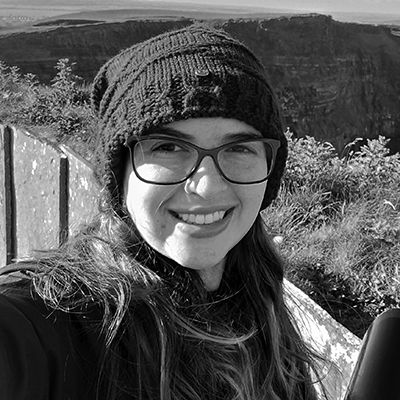
An interview with Clinical Research Scientist, Natália Duarte Linhares, by Amy Swearingen
Tell me about your background before joining Genuity Science?
I am from Brazil, and since the very beginning I have dedicated my career to improve lives of patients with genetic disorders by helping with their diagnosis through genomic analysis. At the Federal University of Minas Gerais (UFMG), I graduated in Biological Science, followed by an MSc and a PhD in Genetics, and five years of postdoctoral fellowships. Throughout this time, I worked in five different research laboratories at UFMG – Microorganism Genetics, Evolutionary Cytogenomics, Biochemistry Genetics, Clinical Genomics and Pharmacogenomics – and I spent a short internship at Ludwig Maximilian University of Munich. In addition to my research experience, I also have worked as a cytogeneticist in a diagnostic laboratory at the Clinical Hospital of UFMG.
Tell me more about your previous experience in the genomics field?
During my PhD and postdoc at the Clinical Genomics Laboratory, I studied patients with undiagnosed rare disorders, similarly to my current role at the Genuity Science, and I had the opportunity to meet several rare disease families. Two of the patients that really touched me, were two brothers that had a severe immunodeficiency and smooth muscle tumors. Their parents did everything to understand their disease. They used to attend so many consultations at the hospital that the older one had around three medical charts with his records. Despite the severity of their disease, they were happy boys with a lot of energy. They changed the lives of everybody that meet them, including myself and their responsible physician who refereed them to our research group. With a collaboration with Ludwig Maximilian University team, we discovered that they had a genetic variant in a gene that was never associated with a disease before: CARMIL2. In addition, they could be cured by bone marrow transplant. We tried to organize their transplant, however, sadly the boys were severely affected when we made the diagnosis, and they did not survive… The older died on my wedding day, and it was very difficult for me… After we published our manuscript, I read in the literature that other patients with the same disease are receiving their diagnosis earlier now, and some of them were cured by hematopoietic stem cell transplantation.
In Brazil, I used to meet the families during their blood collection and when they used to sign their Consent Forms. However, at Genuity Science, we do not know even the patients’ names that we are analyzing, due to data privacy. However, I always try to remember that there is a person and a family behind the genomic data that I am analyzing.
Why did you decide to make the move to Ireland to work at Genuity Science?
I had brilliant teachers and advisors in Brazil that guided myself through this genomic field, in addition to family and friends that I love very much. So, I cannot say it was an easy decision. But when I applied for the job, I saw an opportunity to analyze even more patients’ genomes and make a difference in more people lives. Additionally, I always wanted to have the experience to live abroad. I am working at Genuity Science for two years now (I started the job on 29 April 2019), and I can say that I love the Irish culture, everybody is very friendly. I always say that I am almost Irish now; I drink a cup of tea with milk every day and I already swam in the cold Irish sea – only one time, but I am proud of this achievement!
What is your role in the company?
Currently I am working as Clinical Research Scientist in the Rare Disease Program. My research is focused on analyzing Whole Genome Sequencing data from children with rare disorders, and their families, with the goal of identifying the genetic cause of the diseases.
The program demonstrates the clinical utility of Whole Genome Sequencing analysis in diagnostics. A diagnosis may guide new treatment options, enable precision-medicine interventions or inform a specialized care pathway for the patient. It can also facilitate contact with support groups and provides families with informed genetic counselling.
What does a typical day look like?
I use a powerful software developed by Genuity Science to analyze whole genomes and filter patients’ genetic variants that are related to the patients’ clinical features. When I find a potential causative variant, I classify it according to the latest American College of Medical Genetics guidelines and I make a detailed record of each step of my analysis. It sounds tedious, but it’s far from it. There are so many things that I love about the job. I love that each case that we analyze is unique and we never know what the result would be until we finish the analysis. In addition, since every family that we analyze have a different rare disease, I am always learning. I really like the challenges of studying something new every day.
What do you like most about the job?
It is always very exciting when I find a variant that could be causing the patient’s disease. Some people say that is almost like finding a needle in a haystack because everyone has thousands of variants and usually only one is causing the patient’s disease. When we discover a potential causative variant, I feel very happy for the family, as it may bring closure to their diagnostic odyssey.
It is also a pleasure to work with my colleagues in the rare disease team. The team is very united, we are all passionate about our job and we learn a lot from each other.
What are your hobbies?
As a biologist, I like being surrounded by nature, so I really like hiking and cycling, which are activities that I do a lot in Ireland, especially during the summer. I also like doing puzzles; I have completed one with 6000 pieces in Brazil.